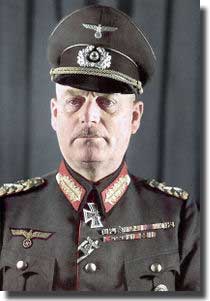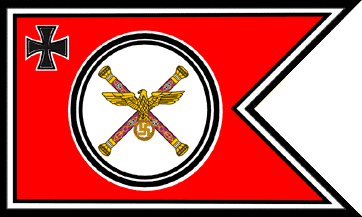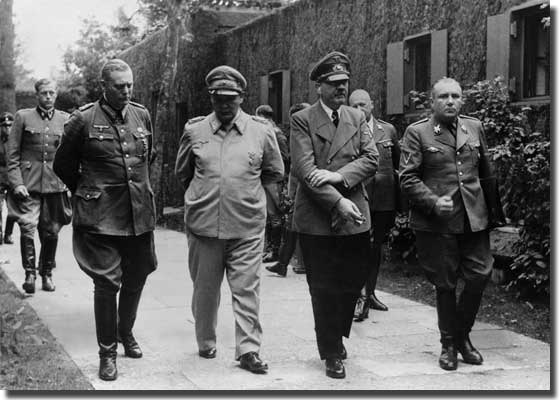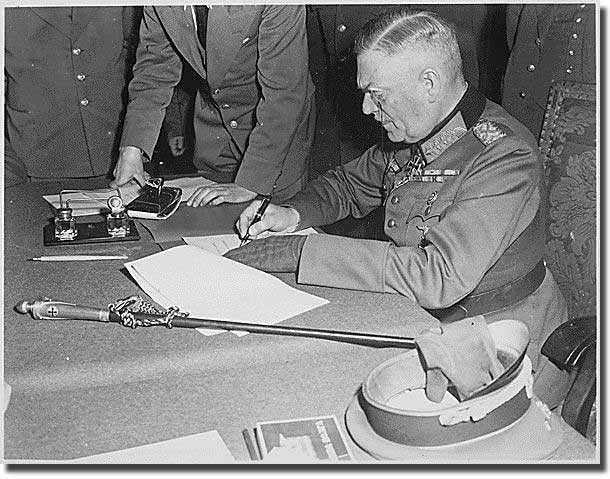 Wilhelm Keitel was born into a farming family near Gandersheim in West Brunswick on the 22nd. of September 1882. He is reported to have wanted to follow his father in this calling, but after his Mother died, his Father remarried, and as the farm was not prosperous enough to support two families, he was bundled off to the Army as an Officer Cadet.
Wilhelm Keitel was born into a farming family near Gandersheim in West Brunswick on the 22nd. of September 1882. He is reported to have wanted to follow his father in this calling, but after his Mother died, his Father remarried, and as the farm was not prosperous enough to support two families, he was bundled off to the Army as an Officer Cadet.
In 1901, Wilhelm joined the 46th. Field Artillery Regiment at Wolfenbuettel in Brunswick, he would rather have ridden a horse in the Cavalry, but his Father was unable to fund a horse for him. On the 18th. of August 1902 he gained his commission as a Second Lieutenant.
Marriage.
Wilhelm married Lisa Fontaine the daughter of a brewer and estate owner from Hanover on the 18th. of April in 1909, she was reportedly beautiful, intelligent, and held high ambitions for her new husband, Lisa was also an ardent admirer of Adolf Hitler. Together they had 6 children, 3 boys who all entered the Army as officers, and 3 girls, one of whom died young.
Wilhelm Keitel's career.
By October 1914, Wilhelm had been promoted to Captain, and in spring of that year he attended an X Corps course, for both present and future General Staff Officers.
He was off to Belgium with his regiment when WW1 broke out, to be badly wounded that September by a shell splinter in his right arm. After his recovery, he became a Battery Commander, and in the next year joined the General Staff of XV Reserve Corps, over 1916-17 we find Wilhelm serving as a General Staff Officer with the XIX Reserve Corps, and then the 199th. Infantry Division. Late in 1917 he joined the General Staff of the Army in Berlin.
Post WW1.
He did a stint with the Freikcorps on the Polish frontier over 1919. His early days of climbing up the Army ladder were steady but not spectacular, three years as a lecturer at the Hanover School of Cavalry over 1920-23, thence off to the 6th. Artillery Regiment. He made Major in 1923.
Now he received a boost in 1925, the Chief of the Army Personnel Office, Colonel von dem Bussche-Ippenburg ( lovely name ) gave him a job on the clandestine General Staff ( known as the Troop Office ) to create reserve forces, really an illegal activity under the Versailles Treaty.
After a spell as Commander of 11 Battalion 6th, Artillery Regiment, Wilhelm became a Lieutenant Colonel on the 1st. of February 1929, and that October rejoined the General Staff as head of its Organizaions Department and charged with the task of secretly tripling the size of the Army from 10 to 30 Divisions. He was part of the group that visited Russia in 1931 to study their training regime, and returned very impressed with both the Soviet Army and its economy.
Health.
Keitel now a full Colonel, suffered from ill health, phlebitis in his right leg, a heart attack, and double pneumonia, all took their toll. On the 30th. of January, 1933 as Hitler came to power, he was recovering in a Tatra Mountains clinic in Czechoslovakia. His old friend Werner von Blomberg was now the Minister of Defence.
First meeting with Hitler.
Having recovered his health, he returned to work at his old job in Berlin, and in July 1933 met Adolf Hitler for the first time, immediately falling under the Fuehrer's spell, and he never lost that idolization.

Cover of Memoirs of Field Marshal Keitel.
Promotion to Major General.
He became Infantry Commander 111, and was made a Major General on April Fool's Day 1934.
He inherited the family farm when his Father died in the spring of 1934, suddenly his latent desire to be a farmer might be realised, and he submitted his resignation from the Army. The Chief of the Army Personnel Office summoned Keitel to a meeting, and offered him command of a division of his choice when Hitler announced his military expansion, on the proviso that he withdrew his resignation.
This carrot could not be resisted, and Keitel chose the 22nd. Infantry Division at Bremen, he wrote later " Such is the force of human destiny." This command lasted but a year when the Minister of Defence offered Keitel the post of Chief of the Armed Forces Office of the Ministry of Defence in Berlin.
He was not keen to give up his Divisional Command, but his wife Lisa urged him to accept, which he did and was made a Lieutenant General as a result of moving, within 19 months he was advanced to General of Artillery on the 1st. of August 1937.
Playing Politics.
After his boss Blomberg had married a prostitute in January of 1938, Keitel did absolutely nothing to protect his supposed friend, actually when such incriminating evidence came his way, instead of destroying it, he passed it onto Goering, well knowing he was after Blomberg's position as Minister of Defence.
When Hitler disposed of Blomberg, he met with Keitel, and promoted him C-in-C of the High Command of the Armed Forces, knowing full well he had a yes man to carry out his wishes. On the 1st. of November 1938 he was made Colonel General.
Now Keitel coveted a Armed Forces High Command, ie operational command over all Army, Air Force and Navy, this was not to be, both Reichmarshal Goering and Admiral Raeder resisting such a move with great vigour.

Flag of a Field Marshal as Chief of the High Command of the Armed Forces 1941-1945
Keitel's unwavering support of Hitler.
As a complete slave to Hitler, Wilhelm Keitel bowed to his every wish and command, there are no battles that he commanded to discuss, as Hitler made all of the decisions. He supported Hitler in gobbling up Austria, and in Germany's annexation of Czechoslovakia.
Keitel was to echo his boss in calling for the supression and extermination of the Jewish race, in Germany, as well as in the conquered countries.
In October 1939, he caused the wrath of Hitler to fall upon him by backing both Halder and Brauchitsch in their opposition to Hitler's proposed invasion of France in winter, not at all what Hitler wanted to hear. Keitel offered his resignation, but the Fuerher would not hear of it, so Keitel lamely indicated, that in future, he would obey orders to the letter, and never question them.
France is humbled.
Of course the demolition of France in 1940 was achieved by the German Army in record time, and Keitel conducted the French surrender, to be rewarded the next month on the 19th. of July, with promotion to the exhalted rank of Field Marshal. Here he was, now at the top of the tree in his chosen profession, a peak he could never have aspired to in his wildest dreams.
Bending to Hitler's will.
In May of 1941 we find Keitel signing off on the Commissar Order, in which he ordered his Field Commanders to liquidate all Communism Party Officials just as soon as they were captured, no trial, no court martial, just SHOOT THEM.
In July, the Field Marshal gave Himmler absolute power for the SS to implement his racial policy in Russia, thus he endorsed mass murder.
As Keitel continued to support Hitler's decisions in the Russian campaign, such as forbidding any breakout for the beleagured 6th. Army at Stalingrad, it ill served his Commanders in the field, and Paulus was forced to surrender, losing thousands and thousands of his troops.
Hold at all costs.
Keitel went on to endorse all of Hitler's orders to " Hold at all costs." By his slavish and easy compliance, he may have clung to his job, but it spelled disaster out in the field, such as destruction of the Army in Tunisia, the 17th. Army in the Crimea cut to pieces, Army Group North cut off in Courland, Army Group South in trouble in the Ukraine, Army Group Centre in Belorussia practically wiped out, and in Normandy, Army Group B smashed.
Stauffenberg's bomb plot.
When on the 20th. of July in 1944 Stauffenberg's bomb exploded in Hitler's Conference Room, Keitel was slightly to the left and behind his master, in his normal position, he quickly supported the wounded Hitler, and then carried him to the medical station for treatment.
He now acted quickly to crush any sign of a possible coup, and presided at the Court of Honour which endorsed the execution of many Officers supposedly involved in the plot to kill Adolf Hitler.

The Führer, Adolf Hitler, nursing a sore arm after an attempt on his life on July 20, 1944. With him are (from left) Wilhelm Keitel, armed forces chief of staff; Hermann Göring, air force commander in chief; and Martin Bormann, Hitler's personal secretary
Suicide of Field Marshal Erwin Rommel.
In October 1944, Keitel was heavily involved in the suicide of Erwin Rommel, he gave him the choice of taking his own life, or a trial by the People's Court.
Surrender.
On the 8th. of May in 1945, Keitel signed the Act of Surrender in Berlin, Admiral Hans George von Freideberg signed for the Army, and for the Luftwaffe, Colonel General Stumpff added his signature.

Keitel, signing the ratified surrender terms for the German Army in Berlin, 8/9 May 1945.
His Field Marshal's walking stick is on the table
Nurenberg Trial.
At the Nurenberg , Wilhelm Keitel stood trial as a major war criminal, but he still maintained his unswerving loyalty to the now dead Hitler. He insisted he was merely " Following his superior's orders, as I was never permitted to make decisions."
But he was still found guilty of " Crimes against peace, of war crimes, and of crimes against humanity."
Conclusion.
Wilhelm Keitel gave unswerving loyalty to Adolf Hitler, was promoted to the highest rank of Field Marshal, for being a " YES MAN " completely overrun by his ambition. His total subservience to his Fuerher, cost him his life, as he was hanged at Nurenberg on the 16th. of October 1946, he was 64.

Some of the defendants at Nuremberg. Front row, from left to right: Hermann Göring, Rudolf Hess, Joachim von Ribbentrop, Wilhelm Keitel. Back row from left to right: Karl Döwnitz, Erich Raeder, Baldur von Schirach, Fritz Sauckel, Alfred Jodl. Courtesy of the National Archives.
return to index of "Adolf Hitler and his WW2 Field Marshals"

 Wilhelm Keitel was born into a farming family near Gandersheim in West Brunswick on the 22nd. of September 1882. He is reported to have wanted to follow his father in this calling, but after his Mother died, his Father remarried, and as the farm was not prosperous enough to support two families, he was bundled off to the Army as an Officer Cadet.
Wilhelm Keitel was born into a farming family near Gandersheim in West Brunswick on the 22nd. of September 1882. He is reported to have wanted to follow his father in this calling, but after his Mother died, his Father remarried, and as the farm was not prosperous enough to support two families, he was bundled off to the Army as an Officer Cadet.



